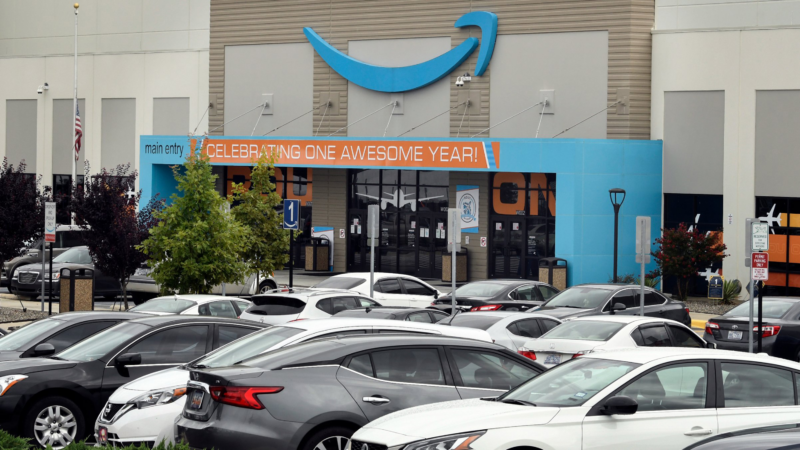Amazon workers vote against unionizing a North Carolina warehouse
Amazon workers in North Carolina have voted against unionizing as the retail giant once again prevailed in its fight against labor organizing.
Around 4,300 workers at a warehouse in Garner, N.C., a suburb of Raleigh, were eligible to cast ballots over the past week. They voted whether to join the grassroots union called Carolina Amazonians United for Solidarity and Empowerment, or CAUSE.
Workers voted nearly 3-to-1 against unionizing. Federal labor officials’ tally showed 829 votes in favor and 2,447 votes against, with 77 ballots set aside as challenged by either the union or the company.
Representatives of the unionization effort did not immediately respond to NPR’s request for comment on Saturday.
Union organizers, who are current and former workers, said they would push for higher wages, more reliable hours, better safety measures and other changes. They faced a staunch opposition campaign by Amazon.
Amazon, the nation’s second-largest private employer in the U.S. after Walmart, has argued its employees benefit from working directly with the company — without the involvement of unions.
“We’re glad that our team in Garner was able to have their voices heard, and that they chose to keep a direct relationship with Amazon,” Eileen Hards, a company spokesperson, said in a statement on Saturday. “We look forward to continuing to make this a great place to work together, and to supporting our teammates as they build their futures with us.”
Hards said in an earlier statement that Amazon “already offers” what unions are requesting, such as “safe, inclusive workplaces, competitive pay, industry-leading benefits — including health care on day one, pre-paid college tuition, and a 401k with company match — opportunities for career growth, and more.”
The company has long fought off efforts to organize its packers, delivery drivers and other employees. In January, workers at one Amazon-owned Whole Foods location in Philadelphia voted to become the first unionized store in the chain. Whole Foods has since asked the National Labor Relations Board to disqualify the union’s win, in part because the federal agency no longer has enough board members to certify the vote since President Trump fired a Democratic member.
The company continues to legally challenge its first unionized warehouse, in New York, nearly three years since the historic vote. In that time, the finances and internal cohesion of that upstart Amazon Labor Union deteriorated. The group has joined forces with the powerful International Brotherhood of Teamsters.
The Teamsters separately organized some of Amazon’s delivery drivers, though the company also does not recognize this representation. In December, the union led drivers and warehouse workers in picketing multiple locations around the U.S., trying to draw more people into the union fold and press Amazon to begin negotiating collective-bargaining contracts.
Amazon is also appealing a November ruling by a federal labor judge that ordered a third union election — a re-redo — at a warehouse in Alabama. In the original 2021 vote, workers overwhelmingly rejected the union. U.S. labor officials later found Amazon illegally influenced the result. The second election’s results remained too close to call for over two years, as the union and the company accused each other of breaking labor laws.
Amazon workers and federal labor investigators have filed numerous complaints alleging labor-law violations and illegal union-busting tactics by the company, which Amazon has denied and legally challenged. In fact, one of the company’s lawsuits has questioned the very existence of the National Labor Relations Board, arguing its structure violates the Constitution.
Editor’s note: Amazon is among NPR’s recent financial supporters.
Trump sets 50% tariff rate for Brazil, blasting treatment of former far-right president
President Trump defended former Brazilian President Jair Bolsonaro, who is accused of plotting an attempted coup following his loss in the 2022 election.
Former White House doctor declines to testify in GOP probe of Biden’s mental acuity
Kevin O'Connor cited doctor-patient confidentiality and his Fifth Amendment right against self-incrimination in deciding not to answer questions from Republicans on the House Oversight Committee.
Celine Song had too much fun as a matchmaker
Filmmaker Celine Song isn't religious, but that doesn't stop her from seeing certain dead insects as signs in her life and treating a good meal like prayer.
Diocese of San Bernardino issues dispensation saying Catholics who fear ICE don’t have to attend Mass
The diocese is the first in the U.S. to issue a special dispensation because of fears over immigration detentions.
Supreme Court blocks part of Florida’s immigration law
Immigrant rights organizations sued the state arguing that its new law conflicts with federal immigration law, and under longstanding Supreme Court precedent, states must bow to federal law in the event of such conflicts.
Clinging to a tree, and praying: how a family survived the Texas flash floods
"I thought my mom was going to die in front of me," said Taylor Bergmann, a 19-year-old who fought to save the people in his family after the Guadalupe River smashed through their home.







